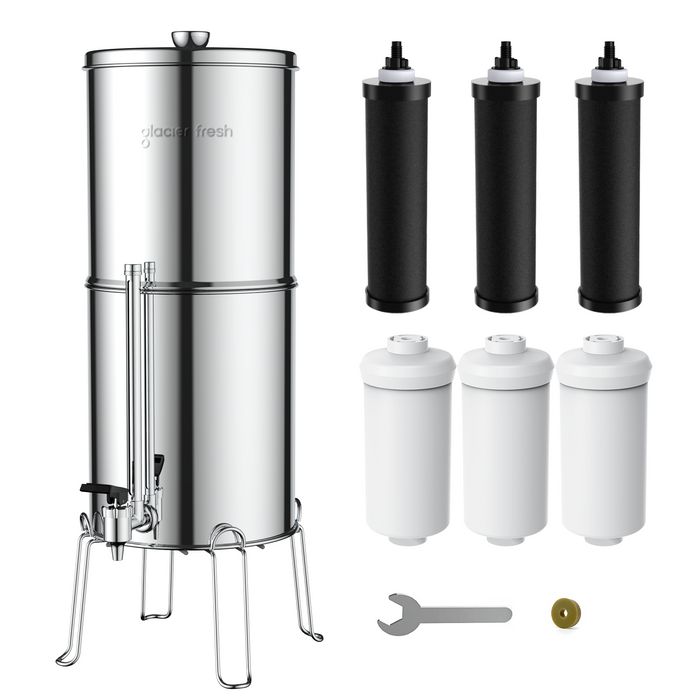Gravity fed water filters are a popular choice for many households and outdoor enthusiasts. These filters use the force of gravity to purify water, making them a convenient and reliable option for obtaining clean drinking water. In this article, we will break down the pros and cons of gravity fed water filters, providing you with a comprehensive understanding of their benefits and limitations.
Advantages of Gravity Fed Water Filters
There are several advantages to using gravity fed water filters:
1. Effective Filtration
Gravity fed water filters are designed to effectively remove impurities and contaminants from water. They typically use a combination of filtration media, such as activated carbon, ceramic, and sediment filters, to remove particles, bacteria, viruses, and chemicals. This ensures that the water you drink is clean and safe.
For example, activated carbon filters are highly effective at removing chlorine, pesticides, and other organic compounds, while ceramic filters can remove bacteria and protozoa. By using multiple filtration stages, gravity fed water filters provide comprehensive purification.
2. No Electricity or Plumbing Required
One of the major advantages of gravity fed water filters is that they do not require electricity or plumbing. This makes them ideal for use in areas with limited infrastructure or during outdoor activities such as camping or hiking. All you need is a water source and gravity to operate the filter.
Additionally, gravity fed water filters are often portable and lightweight, making them easy to transport and set up wherever you need clean water.
3. Cost-Effective
Compared to other types of water filters, gravity fed filters are generally more affordable. They offer a cost-effective solution for obtaining clean drinking water without the need for expensive equipment or ongoing maintenance.
While the initial investment may vary depending on the brand and features of the filter, gravity fed filters typically have a long lifespan and require minimal replacement parts. This can save you money in the long run.
4. Versatility
Gravity fed water filters are versatile and can be used in various settings. Whether you are at home, traveling, or in the great outdoors, these filters can provide you with clean drinking water.
Some gravity fed filters are designed for specific purposes, such as backpacking or emergency preparedness. These filters are compact and lightweight, allowing you to carry them easily in your backpack or store them in your emergency kit.
Disadvantages of Gravity Fed Water Filters
While gravity fed water filters offer many advantages, there are also some limitations to consider:
1. Slow Filtration Rate
One of the main drawbacks of gravity fed water filters is their relatively slow filtration rate. Since they rely on gravity to push water through the filtration media, the process can take some time. This means that you may need to wait for the water to filter before you can use it.
However, this can be mitigated by planning ahead and allowing the filter to work overnight or during periods when you don't need immediate access to filtered water.
2. Limited Capacity
Gravity fed water filters typically have a limited capacity, which means they can only filter a certain amount of water at a time. This can be a disadvantage if you have a large household or need to filter a significant amount of water for a group of people.
However, some gravity fed filters come with larger storage containers or can be connected to additional containers to increase their capacity. It's important to consider your specific needs and choose a filter that can accommodate them.
3. Maintenance Requirements
While gravity fed water filters generally require minimal maintenance, they still need regular cleaning and occasional replacement of filtration media. Neglecting maintenance can lead to reduced filtration efficiency and potential contamination of the filtered water.
It's important to follow the manufacturer's instructions for cleaning and replacing filter elements to ensure optimal performance and longevity of the filter.
4. Not Suitable for All Contaminants
While gravity fed water filters are effective at removing many impurities and contaminants, they may not be suitable for all types of water contamination. For example, they may not effectively remove certain heavy metals or dissolved salts.
If you are concerned about specific contaminants in your water, it's important to research and choose a gravity fed filter that is designed to address those concerns.
Conclusion
Gravity fed water filters offer a convenient and reliable way to obtain clean drinking water. They are effective, affordable, and versatile, making them a popular choice for many households and outdoor enthusiasts.
However, it's important to consider the limitations of gravity fed filters, such as their slow filtration rate and limited capacity. Regular maintenance and choosing the right filter for your specific needs are also crucial for optimal performance.
By understanding the pros and cons of gravity fed water filters, you can make an informed decision and ensure that you have access to safe and clean drinking water.
References
1. Example.com
2. Example.org
3. Example.net

